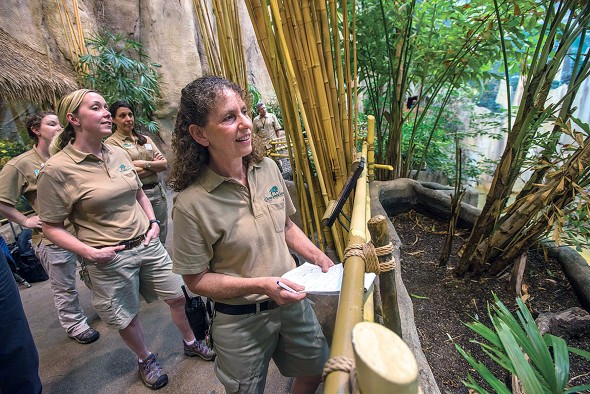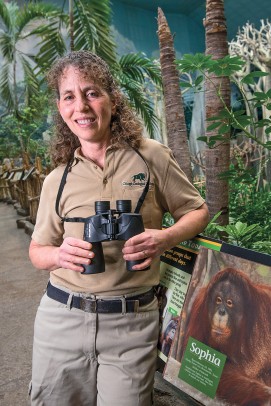Caring for primates at Brookfield Zoo ‘a dream career’

“I love standing out here and observing their natural behavior,” says Nava Greenblatt, UIC alumna and lead keeper of primates at the Brookfield Zoo. Photo: Lloyd DeGrane
By Jonathan Black, UIC Alumni magazine
To most everyone wandering the vast humid space of Brookfield Zoo’s Tropic World, the gorilla mom looks relieved to have finished nursing her 1-year-old baby. Nava Greenblatt knows better.
“There, see, she’s smiling. She’s making what we call her play face. She recognizes me and wants to see if I’ve got food. Uh-oh, looks like she’s a little too close to dad,” says Greenblatt as the 400-pound male gives the female a bump with his shoulder.
“This is the most fun part of my job. I love standing out here and observing their natural behavior.”
Greenblatt has been observing animal behavior at Brookfield Zoo for the better part of 30 years, starting with seasonal work as a UIC undergraduate.
When she graduated in 1986 with a bachelor’s in biological sciences, zoos were redefining the animal keeper’s role from laborer to professional — one that requires a four-year college degree.
“It’s totally a dream career,” Greenblatt says, “and very competitive. There are many more people who would like this job than there are jobs available.”
‘They need to work for a living’
Her current position as lead keeper of primates has meant significantly more responsibility, going to meetings and working with other zoos.
But it’s also meant less time with the animals, which she misses. No specific animal, mind you. Greenblatt is quite firm when asked about her favorite.
“Whichever one is in front of me,” she says with a diplomatic smile, though she loves the otters and does acknowledge a special affinity with the primates. “They seem really bonded to us; they look forward to seeing us. It’s easier to read their behavior.”
If you picture a keeper’s job as someone who just sweeps the exhibit floor and feeds the animals, you’re way off.
“Most people, even those who come to the zoo a lot, don’t realize all the work that goes into taking really good care of the animals,” Greenblatt says.
Much of it is focused on training.

“Most people don’t realize all the work that goes into taking really good care of the animals,” says Nava Greenblatt, a 1986 UIC graduate, of her job at the Brookfield Zoo. Photo: Lloyd DeGrane
“We work with really big animals, like gorillas. We can’t force them to do what we want them to do. We need their cooperation to move from exhibit to exhibit or to switch enclosures.”
Preparing animals for their periodic checkups is a bigger challenge. Giving injections, for example, is part of a “long training process built on trust,” she says.
“We teach them to present a body part, like a hip or shoulder. We desensitize them to touching that area with different things. We work up to touching them with a capped needle. They get a huge reward each time — food is what really matters.”
Keepers ensure that the animals’ environments are stimulating.
“When I started, it was generally assumed that all they needed was food, water and a social environment,” Greenblatt says. “Now we realize they need to be stimulated mentally. They need to work for a living — not everything should be provided easily.”
Brookfield Zoo launched a feeding program to replicate the act of foraging. For instance, the otters are now fed by a conveyor belt that randomly drops fish, keeping the animals alert.
Before, the animals were fixated on the keepers at feeding times. “They have a very good internal clock, so they had a lot of anticipation and anxiety if we were late,” Greenblatt says.
With the new system, “they have to keep checking — fish could fall off the conveyor belt at anytime during the day. It’s more like their experience in the wild where they have to hunt and work for their food.”
What about zoo visitors who plan their arrival for specific feeding times?
“It’s more random for you, too,” she says. “You never know when you’ll get lucky.”
